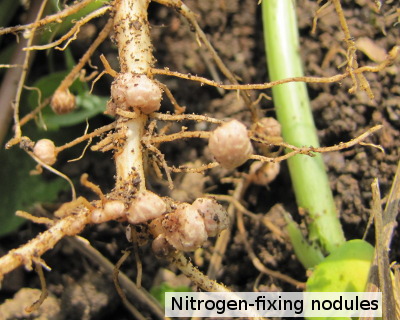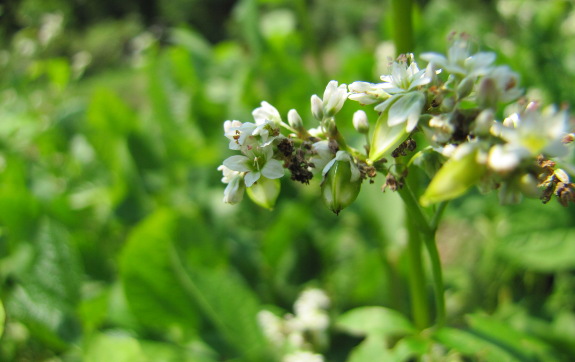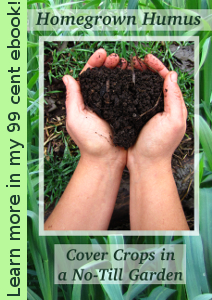
Choosing the best type of cover crop
 When choosing cover crops,
it's handy to look at broad categories to
find out which one (or ones) best fit your needs. The first
distinction to consider is whether your plants are annuals (meaning
they'll go to seed and die in less than a year) or perennials (meaning
they will live for many years). Perennial cover
crops have a place in pastures or tilled-garden settings, but, for our
purposes, you'll be better off sticking to annuals.
When choosing cover crops,
it's handy to look at broad categories to
find out which one (or ones) best fit your needs. The first
distinction to consider is whether your plants are annuals (meaning
they'll go to seed and die in less than a year) or perennials (meaning
they will live for many years). Perennial cover
crops have a place in pastures or tilled-garden settings, but, for our
purposes, you'll be better off sticking to annuals.
It's also helpful to
break cover crops down into two other categories—legumes
and non-legumes. Legumes are members of the bean family, and
cover crop legumes include clovers,
cowpeas, field peas, vetch, and medics. Legumes differ from most
other kinds of plants because they've teamed
up with soil bacteria to
enable them to pull nitrogen out of the air. As a result, legumes
are able to grow in soil that hasn't been recently dosed with manure,
compost, or other nitrogen fertilizers, and (when managed correctly)
legume cover crops can reduce your need to apply compost to the soil.

 Non-legumes include all other
types of cover crops, notably
grains and crucifers (the latter of which are members of the same
family as cabbage and mustard). While legumes can make their own
nitrogen and act as quick fertilizers for the soil, non-legumes make
more organic matter and enrich the soil longer-term.
Non-legumes include all other
types of cover crops, notably
grains and crucifers (the latter of which are members of the same
family as cabbage and mustard). While legumes can make their own
nitrogen and act as quick fertilizers for the soil, non-legumes make
more organic matter and enrich the soil longer-term.
I explain
more about how to maximize the amount of organic matter you get from
your cover crops in Homegrown
Humus, but for now,
it's worth
considering why you want to grow cover crops. Are you trying to
replace the compost or manure used to fertilize your garden
annually?
If so, go for legumes. On the other hand, if you're like me and
are trying to improve the quality of your garden soil, you'll want to
stick to grains and crucifers.
| This post is part of our Homegrown Humus lunchtime series.
Read all of the entries: |
Want more in-depth information? Browse through our books.
Or explore more posts by date or by subject.
About us: Anna Hess and Mark Hamilton spent over a decade living self-sufficiently in the mountains of Virginia before moving north to start over from scratch in the foothills of Ohio. They've experimented with permaculture, no-till gardening, trailersteading, home-based microbusinesses and much more, writing about their adventures in both blogs and books.
Want to be notified when new comments are posted on this page? Click on the RSS button after you add a comment to subscribe to the comment feed, or simply check the box beside "email replies to me" while writing your comment.

De --- Thanks for reading! If you get a chance to leave a review on Amazon, you'd make my day --- I don't have any reviews yet, and strangers generally won't try an unknown without reviews.
I'll look forward to hearing your questions, in part because it'll probably help me tighten up the book. Always glad to hear from folks planning to plant cover crops!
Always glad to hear from folks planning to plant cover crops!